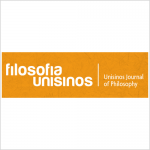Situating mental time travel in the broad context of temporal cognition: A neural systems approach
Vol 19, No 1 (2018) • Filosofia Unisinos - Unisinos Journal of Philosophy
Autor: Fabiana Mesquita Carvalho
Resumo:
Mental time travel (MTT) is the ability of remembering personal past events or thinking about possible personal future happenings. This mental property is possible due to our capacity to be aware of subjective time, which enables us to experience the flow of time, to conceive non-present times, and to process time as a dimension of real world phenomena. Temporal cognition encompasses the mental functions which rely on temporal information enabling the experience of the temporal flow and the processing of the temporal dimension of external phenomena. Given the broad range of our time experiences and, hence, the broad scope of our temporal cognition, it is expected that certain kinds of temporal information can be of particular importance when we mentally transport ourselves to events in the past or future, whereas others could be unrelated to this mental property. The present paper seeks to situate the process of MTT within human temporal cognition. This will be done by identifying the commonalities and differences in the neural correlates of MTT and those of the three main subjective time processing systems, namely metric timing, ordinal timing and autobiographical timing.
ISSN: ISSN: 1984-8234
Texto Completo: http://revistas.unisinos.br/index.php/filosofia/article/view/fsu.2018.191.09
Palavras-Chave: mental time travel, time perception,temporal

Filosofia Unisinos - Unisinos Journal of Philosophy
The journal Filosofia Unisinos - Unisinos Journal of Philosophy is published once every four months by Universidade do Vale do Rio dos Sinos.
Articles must be original, unpublished, and not under consideration for publication anywhere else and can be written in Portuguese, English or Spanish
Filosofia Unisinos - Unisinos Journal of Philosophy prints articles, translations and critical book reviews. It also reprints papers that are considered fundamental to the area when authorized written permission is given by the original publisher.
